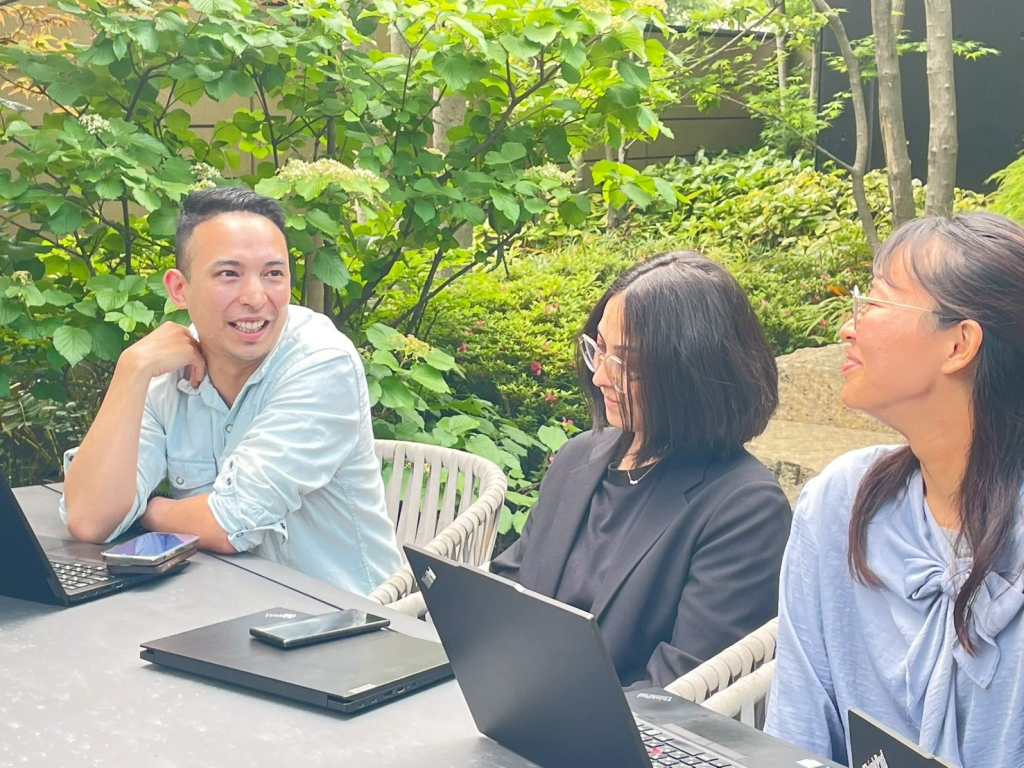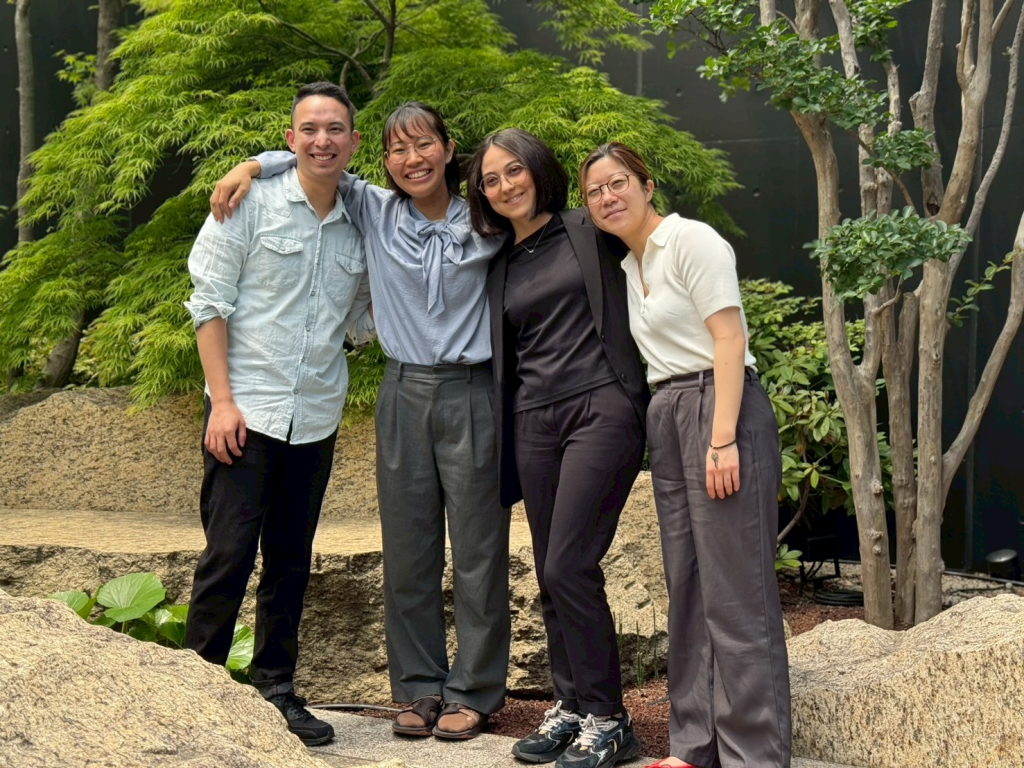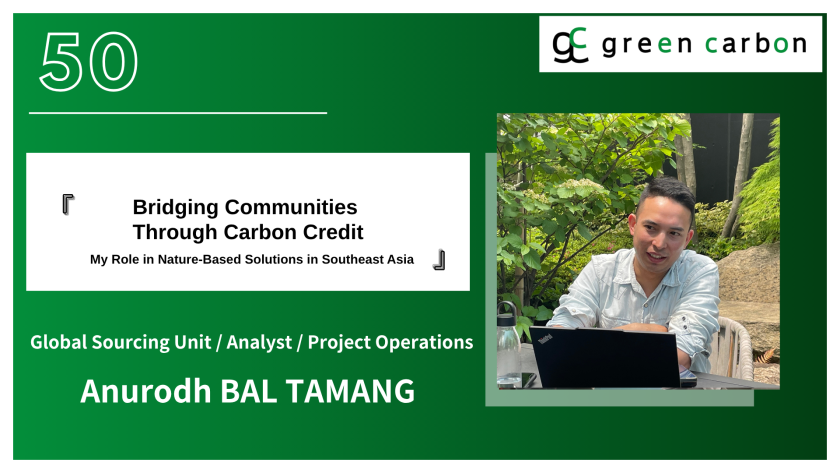My Role in Nature-Based Solutions in Southeast Asia
Name: Anurodh BAL TAMANG
Position: Analyst/Project Operations, Global Sourcing Units
Specialization/Responsibilities: AWD Project Operations Lead in Thailand and Cambodia
Reason for Joining Green Carbon: I joined Green Carbon driven by a strong commitment to sustainability and community development. After transitioning from the travel industry to pursue a master’s degree in international cooperation, I sought meaningful opportunities to work directly with vulnerable communities in Southeast Asia. Green Carbon’s mission to create nature-based businesses in developing countries and its dynamic startup environment resonated deeply with my personal and professional aspirations.
Career Background: I worked in the travel and hospitality industry for five years, primarily in the Sports Marketing division until the Tokyo 2020 Olympic and Paralympic Games. In addition, I held various other marketing positions focused on the Asia-Pacific region within my previous company.
Major/Studies: Hospitality and Tourism Major (Undergraduate), International Cooperation Policy Major (Graduate)
Hobbies/How I Spend My Days Off: Hiking, cooking, and watching sports.
SNS (LinkedIn etc.): www.linkedin.com/in/anurodh-bal-tamang-0a6344222


Q. Could you please provide a brief self-introduction, including an overview of your career to date?
Hello, I am Bal, originally from the beautiful country of Nepal. I completed both my undergraduate and graduate studies at Ritsumeikan Asia Pacific University in Oita, Japan. During my graduate program, my research focused on building safe, resilient, and sustainable tourism communities.
Currently, I work as a Project Operations and Analyst at Green Carbon Inc., where I oversee the implementation of Alternate Wetting and Drying (AWD) projects in Thailand and Cambodia as part of our carbon credit initiatives.
Before joining Green Carbon and pursuing my graduate studies, I spent several years in the travel and hospitality industry. I managed logistics and hospitality projects for major international events, including the Tokyo 2020 Olympics and Paralympic Games, and led digital branding and social media strategies for the Global Inbound division at the Asia Pacific headquarters of my previous company.
Q. What kind of work are you involved in? Could you share more about your roles?
As the Project Operations Lead, my role encompasses a wide range of responsibilities. I work closely with local teams, stakeholders, government agencies, and partner universities to ensure that projects are implemented in a timely manner and in full alignment with technical and methodological standards.
I also support critical functions such as budget planning and negotiation, data monitoring (including water levels, gas emissions, farming practices, and soil sampling), as well as coordinating the preparation of project documentation required for certification processes.
In addition to field operations, our team plays a key role in strengthening internal processes. This includes developing operational manuals and onboarding guides, as well as organizing training sessions to build staff capacity.
Q. What led you to pursue your current job?
My interest in the sustainability field stems from my growing up in Nepal, where I witnessed climate change and natural disasters up close. That is why, although I previously worked at a travel agency, the COVID-19 pandemic prompted me to consider what I could do for sustainable community development. This led me to pursue a master’s degree in international cooperation and policy. After graduating, I aspired to work in the development sector, perhaps as a development consultant.
While researching companies with this focus, I found Green Carbon. Why did I want to work here? The appeal was its challenge to the sustainability sector as a startup and its aim to create a positive environmental impact by building nature-based businesses. What was particularly significant for me was my strong desire to do something for vulnerable communities and farmers in Southeast Asia and work directly with them. I chose Green Carbon to help address that.
Furthermore, my family runs an agriculture-related business, working to make the supply chain for fresh vegetables and fruits more sustainable and to reduce food loss. So, I felt a strong alignment between the company’s vision and our own aspirations to make a positive impact through the power of nature.
Q. What do you find most rewarding or fulfilling about your work?
What I find most rewarding about my work is constant learning, both on a technical and cultural level. Beyond deepening my understanding of carbon credits, I have gained valuable insights into traditional farming practices and the complex dynamics of rice field ecosystems. Engaging with local stakeholders has also allowed me to learn about diverse cultural perspectives in the agriculture industry. Understanding the challenges they face and thinking critically about how we can help address them is something that deeply motivates me.
I also find it fulfilling to be entrusted with significant responsibility from the early stages of my role. Despite being new and coming from a different background, I was given the opportunity to manage cross-country operations, which have been both humbling and inspiring. This trust drives me to keep learning and improving. While managing super technical projects across Cambodia and Thailand comes with its challenges, it also offers a unique opportunity to grow, adapt, and contribute meaningfully to sustainable development.
Q. What challenges have you faced so far?
One of the key challenges I currently face in managing operations across both Cambodia and Thailand is navigating the differences in working cultures, stakeholder dynamics, and applicable carbon credit methodologies. Each country presents its own unique context, requiring a high degree of adaptability and nuanced understanding.
As I am still relatively new to the role, I am in the process of building a deeper grasp of the technical and methodological details involved in our operations. At times, the lack of clear answers or direction, especially when timely and accurate decisions are needed, can be discouraging. However, I try to refresh myself and see this not as a setback, but as a valuable opportunity for growth. It pushes me to engage more proactively with colleagues and partners, read more, ask better questions, and continuously sharpen my understanding so that I can lead with greater clarity and confidence moving forward.
Q. Where do you see yourself in 10 years, and what are the challenges you’re excited to take on?
Personally, I am not someone who tends to look too far into the future. However, if I were to envision the next 10 years, I hope to be in a position where I can make a broader impact in the field of sustainable development, particularly through involvement in policymaking. I am eager to take on challenges that bridge local needs with global sustainability goals and to help design inclusive, community-based solutions that address both environmental and social issues.
I am also excited about the prospect of expanding our operations beyond Asia. Applying the lessons learned in Southeast Asia to new regions—while adapting to different environmental, cultural, and regulatory contexts—is a challenge I would welcome. Additionally, one of my long-term aspirations is to contribute to initiatives that connect Japan and my home country, Nepal. Although Nepal is a small nation with its share of political complexities, I believe there is strong potential for meaningful collaboration, especially in areas such as nature-based solutions and carbon credit development.

